Civil Defense in Syria: Heroes Who Work without Rights or Privileges

Civil Defense in Idlib and Dara'a: Hardships and Efforts to Develop the Work
(1)
*Rana Khalil
Civil Defense teams work in areas that are dominated by the opposition using methods and norms that differ from those that work in neighboring countries and the rest of the world where teams work in normal situations and respond to crises once they occur. In Syria, however, insecurity always accompanies the Civil Defense’s work. Regime shelling and bombing occurs frequently while Civil Defense team members are trying to recover the bodies of victims, and they are often killed doing their work.
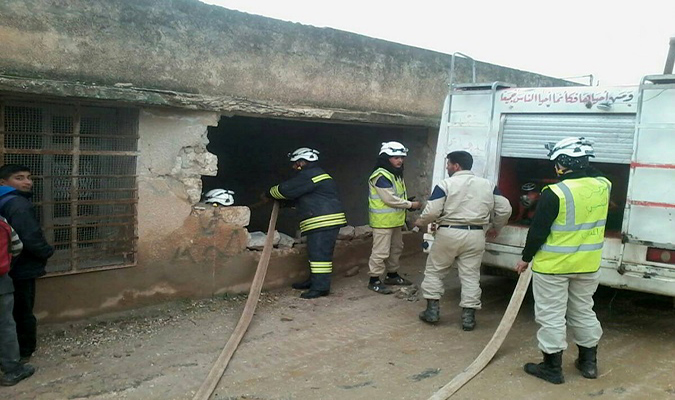
The Civil Defense was developed from individual and collective efforts among Syrians in areas that rebelled against the Assad regime, and it was established as an administrative organization despite its lack of institutional capacities and tools. Additionally, Civil Defense team members make efforts to improve their training tools, especially since the trainings they receive in Turkey largely revolve around environmental and natural disasters during peacetime rather than the situation in Syria, where the regime continues to shell and bomb its people on daily basis.

Attempts at Self-Improvement
Due to the difficulty Syrians face crossing the Turkish border, especially from rural Damascus and Dara'a, the founders of the Civil Defense moved trainings into Syria. The Civil Defense in Aleppo and Idlib also moved their trainings to Syria, despite having easier access to Turkey.
Abu Salah, one of the founders of the Civil Defense Committee in Dara'a, told Suwar, "We moved the trainings into Syria because it is difficult for the trainees to enter Turkey, as many of them do not have passports or IDs because they defected from the regime. Moreover, it is difficult to provide accommodation to the trainees in Turkey because it is so expensive".
He added, "We are trying to involve those who defected from the regime because they have experience in rescue missions as well as expertise that can be helpful for training the new members." Abu Salah also said, "We began as random teams that worked in a chaotic manner and now we are able to organize ourselves to efficiently qualify, train, organize, and institutionalize the Civil Defense; the management follows up and evaluates the performance of the members on a permanent basis through specialized staff. Members whose work is weak attend extra trainings in order to enable them to improve."
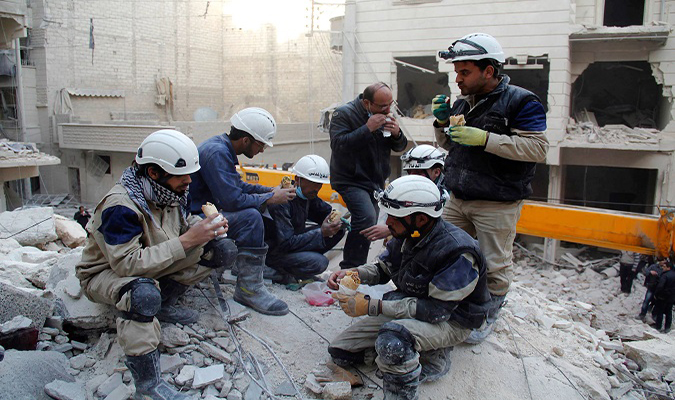
One of the training supervisors in Idlib said, "We held twenty trainings during the past eighteen months, but we still face hardships in completing trainings due to our lack of funds and tools. These circumstances do not mean that we are powerless, but we are trying to adapt our trainings to use the available tools and we are outsourcing the available tools in the neighboring centers to hold trainings for new teams."
Hussam Badawi, a Civil Defense member in Idlib said, "The trainers who work inside Syria try to provide appropriate training for the circumstances under which we work, because regular trainings focus on teaching procedures necessary to recover from natural and environmental disasters such as earthquakes and arson, but not measures specific to the Syrian conflict, which is an extreme case. Therefore, we are trying to delete some sections from our training program and provide trainings for the procedures that should be followed during artillery and aerial shelling and the circumstances of a military battle."
He added, "We can say that the Civil Defense in Idlib today, after various efforts and several trainings on different levels, is able to do highly competent work, as long as the tools that we depend on to form a strong institutionalized body are available to us." Badawi told Suwar, "We reach all the liberated cities and countryside in the province. We operate twenty-three centers; four in Jisr Al Shugour, four in Marrat Al Nouman, four in Idlib, one in Areeha, five in Harem, three in Khan Shaikhoun, and two training centers." Badawi added, “We are not specialized in specific cases and our work covers all emergencies from which civilians suffer such as bombardment, and destruction of infrastructure, including public and private properties. Our teams head to shelled areas in order to recover bodies, move the injured, remove the debris, and help the medic teams to transport the wounded. We intervene in some other cases such as traffic accidents inside the cities and towns or on highways, in electricity accidents that cause fires. Our activities include camps inside Syria, where we construct and pave roads. We also provide the IDPs with fuel and heating tools during times of conflict, in addition to repairing tents that were damaged by the harsh winter that Syria witnessed, and transporting the damaged to safer areas in the Idlib countryside."
The Civil Defense Committee in Dara'a

The Committee was established around two years ago. It provides all sorts of services such as rescue and paramedic services, repairs to water and sewage infrastructure, collection and management of garbage, and supervision of body burials in collaboration with forensic teams.
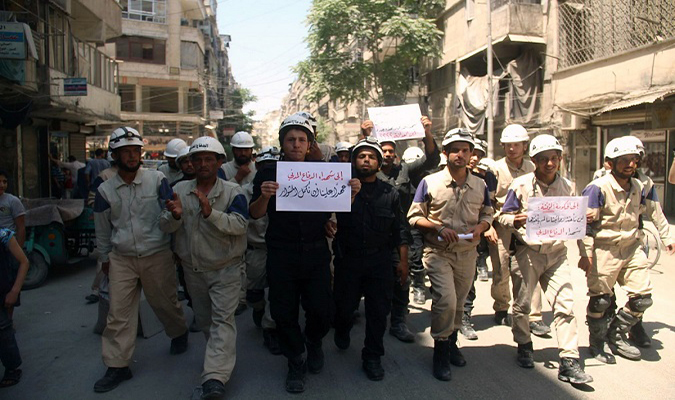
One of the Committee members told Suwar, "We do not distinguish between the Free Syrian Army’s victims and regime forces’ victims; we collect the bodies and bury them. We often bury the bodies of regime forces in special mass graves after documenting their names and photos, in order to exchange them in the future with bodies that the regime has buried."
"We do not distinguish between our martyrs and their killed, we have to respect dead human beings regardless of their political attitude. This what our religion and the ethics that we were raised with demand of us. Meanwhile, the regime forces leave the bodies of our killed to be eaten by the stray dogs."
Dara'a has a unique experience that focuses on training women to work with the Civil Defense teams. A group of women, in collaboration with the Syrian Civil Coalition, created workshops to teach women the importance of the Civil Defense and to instruct them on how to promote its culture, and support the men working for the Civil Defense.
Civil Defense Personnel Have No Health Insurance
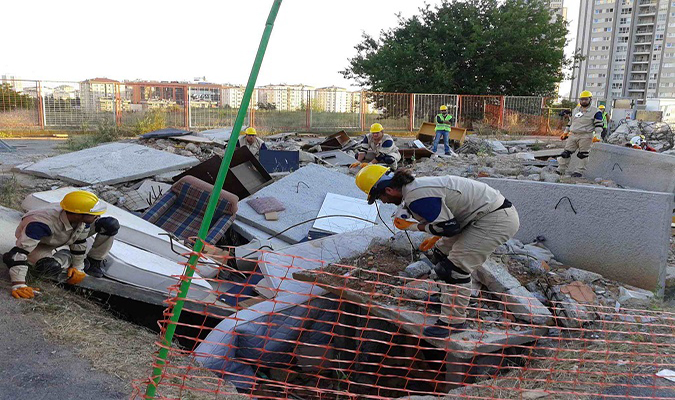
There is neither health nor life insurance that covers Civil Defense personnel, despite the dangerous nature of their work. Abu Salah, from Dara'a, said, "There is no health insurance or any other sort of insurance that cover the staff of our establishment. During our work, we have lost a number of our colleagues, some of whom were injured, and we could not provide them with wages during their recovery. All we can do is provide free treatment in Syrian and Jordanian field hospitals, along with some individual support and food parcels." He added, "We prepared a project proposal for the Civil Defense and we will submit it to donors. The project includes health insurance for our staff, and provides wages in case of injury during work."
***
Despite the Absence of Salaries the Civil Defense Continues its Work in Aleppo in a Spirit of Community Collaboration
(2)
*Sami Al Halabi
The Civil Defense in Aleppo is considered the most important civil achievement by Aleppo activists and military factions. It started its work by offering volunteers to rescue the victims of the regime's shelling, and has developed to provide its services in different domains.
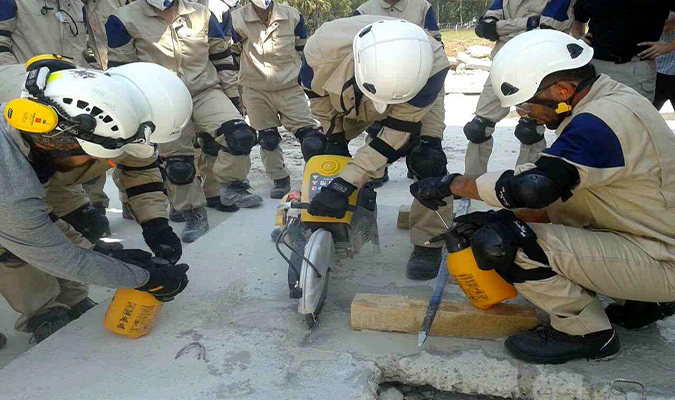
Abu Tariq Al Fahem, a nurse, told Suwar, "The Civil Defense was developed without support from the opposition and without political money that could push a certain political agenda."
He added, "We started our work as volunteers, then we developed more and more. We received some donations from foreign organizations, especially in the field of equipment and communications devices."

Various Initiatives
The Civil Defense’s work is not limited to rescuing the injured and clearing the debris of shelled buildings, but also includes all aspects of life. Abu Ismat, one of the volunteers in the western countryside of Aleppo, said "We help the civilians in everything; when traffic accidents take place, we rush to pull the vehicles and the injured with the paramedic teams. We also provide the service of constructing pathways. We help the civilians in the camps, and we collaborate with the local councils on implementing their projects. Our activities are not limited to overcoming the results of the regime's shelling. Several days ago, our teams rushed to the Atma area along the Turkish border to fight fires caused by aerial bombardment of the international coalition on Al Nusra Front locations." Abu Ismat notes, "We work neutrally with the civilians and military factions. We provide our services to all regardless of their affiliation since our mission is humanitarian, for all human beings."
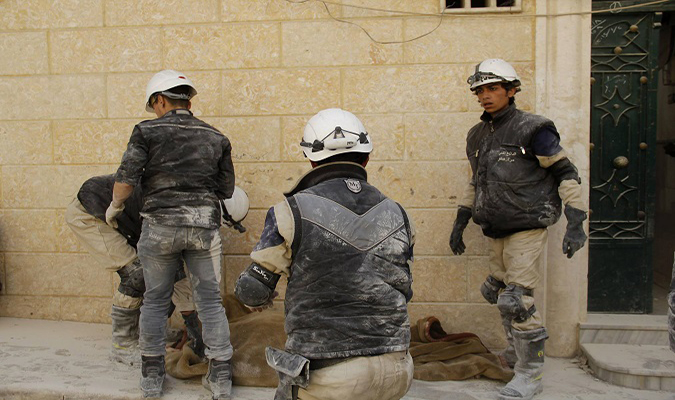
Awareness Campaigns and Activities to Commemorate Anniversaries
A group of city activists support the members of the Civil Defense by promoting a culture of volunteering, the importance of the Civil Defense and the necessity of cooperating with it. The activists target young people to increase their awareness in this matter. They also create advertising campaigns to prepare young people to support the Civil Defense.
Additionally, the Civil Defense tries to immortalize the memory of its members who were killed performing Civil Defense work by organizing sporting activities, the latest of which was a football match between the young members of a rescue team with the name of "The Martyr Hassan Balkash," out of respect for his work with the Civil Defense. Prizes were distributed to the players and the team was awarded a trophy by the Civil Defense in Aleppo with his name.
Malfunction of the Interim Government
Obaida Azawany, from Darat Izza in the western countryside of Aleppo, told Suwar, "Since the Civil Defense emerged in Aleppo, I have been hearing that the Interim Government is short in paying the staff salaries. How can this be a real government? Is it possible that the salary of a Civil Defense member is $150 and the salaries of the government employees equal thousands of dollars, and the government cannot pay Civil Defense members monthly salaries?”
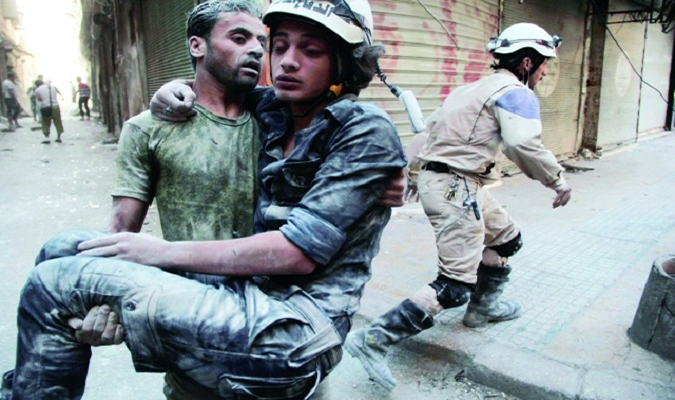
Hussien Al Bakri, the Minister of Local Administration, Refugees and Relief, said, "We stopped paying the salaries during the past period due to the financial distress that the Syrian Interim Government suffers, but the government provides support through its partners in other organizations." He added, “We are going to establish a hundred centers for the Civil Defense inside Syria and hire about 1,600 members."

Civil Efforts to Gain Support and Funding
A few days ago, a number of city activists finished a fundraising campaign for the salaries of Civil Defense employees after being stopped for three months. One of the campaign participants told Suwar, “The revolution started with peaceful flags and signs with slogans, all of which we provided with our own money. We do not need the government or the Coalition. Civil Defense members are risking their lives, and the Interim Government fails to pay their wages. Our duty is to support them with all methods and tools. This is the least we could do for our heroes. Our ambition was to collect $15,000, and because we stood united as Syrians in cohesion and solidarity, we collected $42,000. Most of the donors were young, not traders or businessmen, and despite their state of distress, they insisted on paying support to the Civil Defense."
Humanitarian Hardships
The regime’s shelling and bombing campaigns have resulted in thousands of civilian casualties and vast destruction of infrastructure and public institutional buildings, affecting 40% of the populated areas.
Abu Isma said, "We witness a very difficult humanitarian crisis, especially since most of the members are volunteers who have never worked this profession before. A lot of them are college students, teachers, and professionals who left their jobs to join the Civil Defense." He added, "At the beginning of the bombing campaigns at the end of 2013, we were experiencing death every minute. The shelling starts at seven in the morning and continues until the last hours of the night. You see fear and panic in people’s faces.”
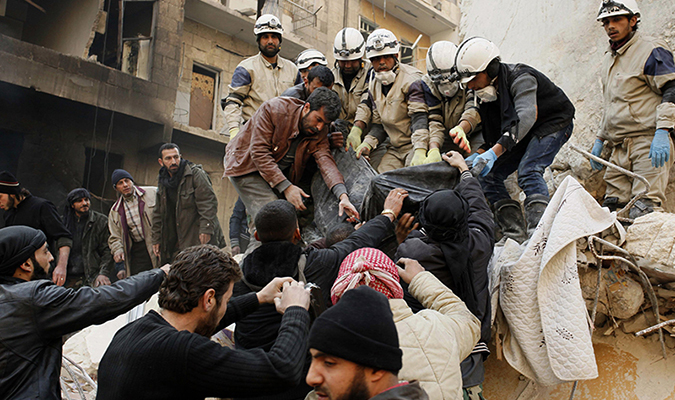
He added, "I witnessed a very harsh case where I felt powerless and I was unable to help. A mortar shell was dropped in Darat Izza and caused a fire in a gasoline shop. In front of my own eyes, five people were burned and although it was possible to save them, our lack of communications devices with the fire trucks made saving them impossible. We had to send a vehicle to tell them but it was too late. They burnt in front of my eyes while I was waiting for the fire trucks." Concerning the hardships he said, "It was different due to the conditions. In the beginning it was limited to providing a food parcel for each Civil Defense member and later developed to provide salaries and equipment. One of the real challenges was the intervention of the military factions in the Civil Defense’s work and their attempts to take its vehicles. After the middle of October 2013, the bombing campaigns started in Aleppo, and [the Civil Defense was] limited in finding ways to continue after the shortage of members, equipment and vehicles.”
Civil Defense Team Feeds the Cats
Although the Civil Defense teams’ primary purpose is to save people, Aleppo Today Channel said that the members of the Civil Defense in Aleppo have been working for months on feeding the hungry cats in the city, especially in the neighborhoods that were deserted by their residents such as Qadhi Askar and Hanano residences, despite the difficult situation and lack of wages.

One of the employees told Suwar, "We come daily to Hanano residences and feed about 100 cats with what we can buy at our expense." The employee added, "Our work is not limited to rescuing the civilians, the humanitarian work is for every human and creature, and these cats are souls that need to be fed."



